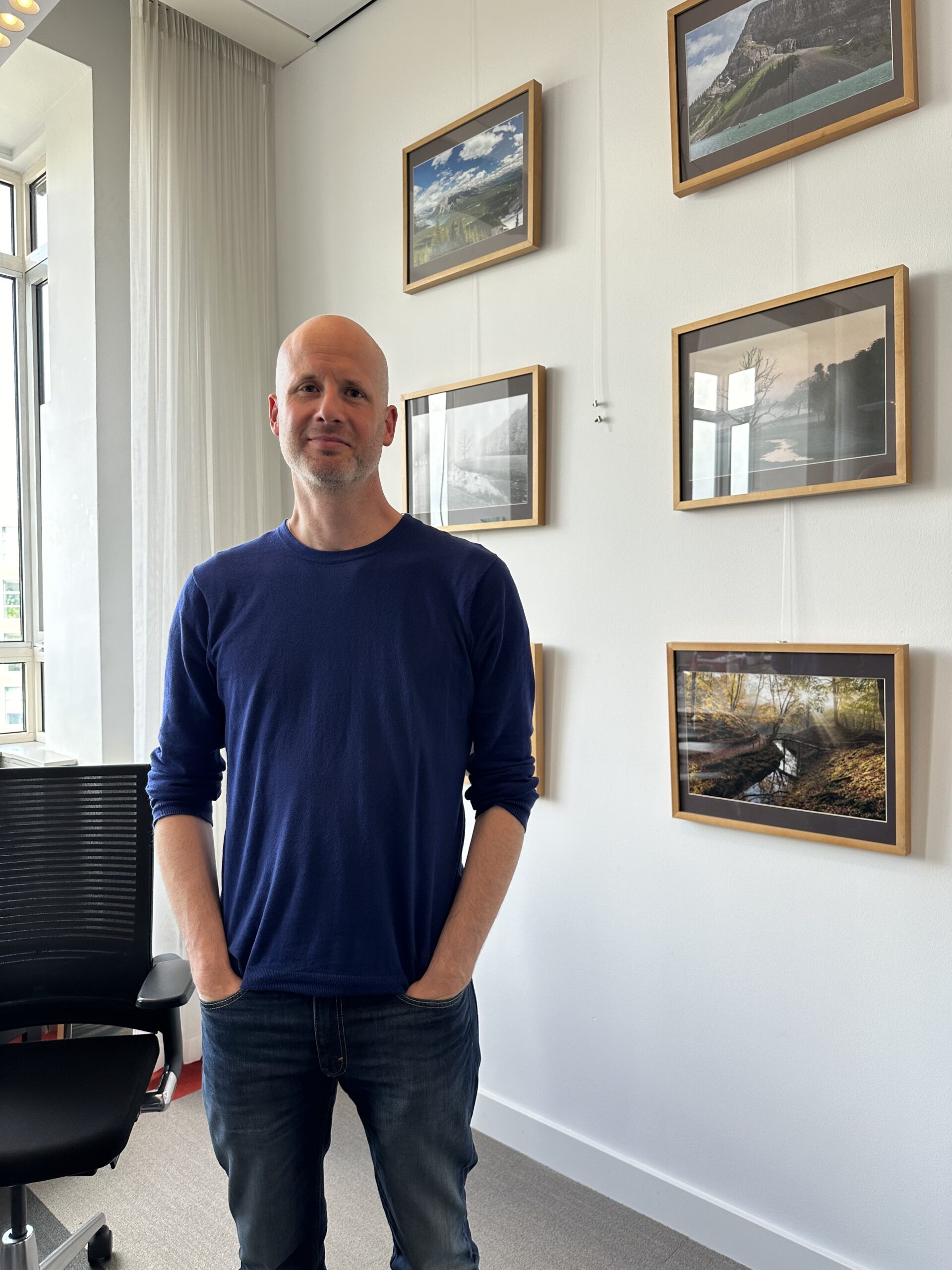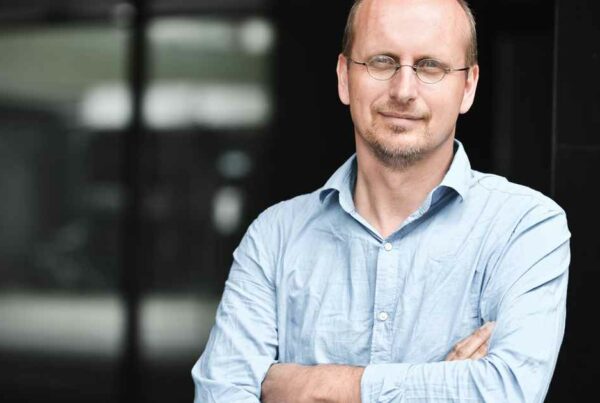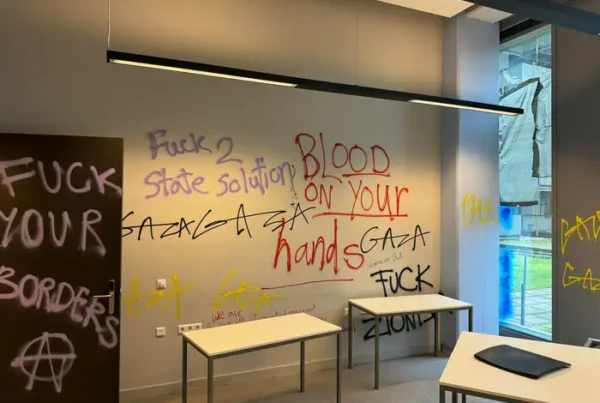
Last month, we paid a visit to Roeland Voskens, who was happy to chat with us about his hobbies, teaching, and what inspires him. Roeland has been a lecturer at the UvA, his alma mater, since 2007. Besides teaching, he also develops courses for Bachelor and Master psychology students, including the second-year course Scientific and Statistical Reasoning (SSR).

What is your favourite psychology related film/book/song and how has that influenced your perspective on the subject?
Last year I read a non-fiction book called ‘Why Fish Don’t Exist’, about classifying biological species and the personal experience of the author. This is intertwined with the founder of one of the Ivy League campuses in the United States (David Starr Jordan). It turns out he had very strong and weird ideas about order in society and how science can inform us about what the proper social order should be. The author discovers all kinds of things being wrong with this, up until the point that she finds out that fish as a species don’t exist. It completely undermines the view of hierarchical order – the social categories we create to make sense of the world.
Obviously, fish exist because look at them, they’re there. But there is no single characteristic that only applies to fish and not to other animals. And I think there’s a lot of that in psychology as well. If you’re talking about mental illnesses or the way that we categorise memory, or other ways that we think about psychological constructs. We have a lot of discussions about ‘does it exist in this way’, or ‘does it just exist because we measure it in this way’. So I think there’s a lot of connection there.
What makes you feel better when you are not having the best day?
What makes me feel different at least is maybe a bit of a cliche answer, but it’s still true – my daughters (3, 5). It basically scrambles whatever you’re doing before, if I get home and we do whatever’s happening and whatever engages them at the moment. It requires a complete switch from whatever was happening in my life. It’s not like it’s ‘sunshine and flowers’ always all the time at home, but it does shake things up. Taking walks in nature also changes that. It’s more likely to make me feel good as well. But the thing that comes to mind immediately is that: family life just shakes things up.
What do you do on your free day?
Well, again, my free time of course is family life. This weekend, for example, two of my nephews came over and we went to an open house of the fire department. They’re mesmerised by fire hoses and stuff like that.
Beyond that (also kids related in part) is photography, which has interested me for 10-20 years now. I photograph my kids mostly and some landscape photography, or other stuff that strikes my interest. At the best of times it really changed my perspective. It’s almost like you’re deconstructing your perception and noticing stuff for the first time. Because of the way light is, or the way that you isolate an element of what you’re seeing.
How did you get into photography? And what kind of photography do you do, analog or digital?
Always digital. So I started when digital photography became more accessible, I think 2003-2004. My father had kept all the film negatives and photos he took, and I made a selection, scanned them, and edited the photos as well. I noticed that around the time I started doing photography, he switched from film to digital as well. I always felt that digital photography made it easier to learn, because you directly see the result of the picture you’re taking.
And why I started doing it, I think at some point I asked for a camera for my birthday. And they gave it to me and just started shooting. What I liked about it from the get-go was how you’re overly focused on a single moment in time and a single detail. It really makes you overthink: what is this? What am I looking at? You slice your experience in a different way, and that’s what I really like about photography. It makes you think about what you’re seeing and why you’re seeing it that way.
If you were granted full control to change one thing (anything) at the UvA, what would that be?
I would maybe no longer have large scale lectures, which is weird because I teach a lot of them. What I do like about larger lectures is that a lot of people are together and that it’s the only place you get the sense of actually learning and teaching stuff at university. But it also doesn’t kind of matter, right? If you’re a group of six hundred students and three of them don’t show up, it doesn’t really change the course of the lecture that much. It turns out 50% of students don’t come to the lectures, so at some point you need to wonder what we are doing for the 50% that self-select out of the lecture.
I think we could do more to explore alternative options. Maybe if lecturers don’t spend their time preparing and teaching lectures but have good videos instead, they can spend their time on making sure there’s more diversity in the rest of the teaching. If I can spend my time creating different versions of the same tutorial or training tutors to teach different versions of the tutorials at different levels, or focused on different topics, I think that could be worth exploring.
I’ve changed my view a little bit – I do see the point of the lectures themselves as a general meeting. But do you need to have that four times a week? You can also have one, maybe two, general lectures a week, and spend the rest of the week doing something else. At some point, there might be more value in teachers recognising and responding to students with specific questions. The large scale lecture, though an efficient and low-cost way of teaching loads of students, doesn’t really allow for that.
Which courses do you like teaching the most, and why? (Anonymous poll question)
SSR. It’s an easy answer. The reason why is, together with Sharon and all the other people involved, we set up the course from the get-go. The team was very dedicated and also flexible thinking about it, like do we want to teach it in this format or a different format. What we try to do in the course is connect general reasoning skills to scientific reasoning, which I feel is really important. I think I’ve wondered this as a student as well, if you’re not going to do a PhD or remain in academia after your Bachelor or your Master, what is the point of all those methods and statistics related courses? And I think we tried to make that more explicit.
Also important is applying critical thinking to yourself, the stuff you learned in science and understanding the type of knowledge that is produced in science. This also connects to the book I mentioned in the beginning. So it’s not like there is a natural order of scientists – we are the only ones that are allowed to discover what it is, and now I’m going to tell you what’s what, because I have a PhD or a bachelor or master of science, and I know what’s really true, right? So there should be some nuance to that as well. Yes, you learn an approach to the truth, and the facts that we value, we value for a reason. But it’s not like you can’t be wrong anymore now that you have a degree, right?

What is your favourite psychology related film/book/song and how has that influenced your perspective on the subject?
Last year I read a non-fiction book called ‘Why Fish Don’t Exist’, about classifying biological species and the personal experience of the author. This is intertwined with the founder of one of the Ivy League campuses in the United States (David Starr Jordan). It turns out he had very strong and weird ideas about order in society and how science can inform us about what the proper social order should be. The author discovers all kinds of things being wrong with this, up until the point that she finds out that fish as a species don’t exist. It completely undermines the view of hierarchical order – the social categories we create to make sense of the world.
Obviously, fish exist because look at them, they’re there. But there is no single characteristic that only applies to fish and not to other animals. And I think there’s a lot of that in psychology as well. If you’re talking about mental illnesses or the way that we categorise memory, or other ways that we think about psychological constructs. We have a lot of discussions about ‘does it exist in this way’, or ‘does it just exist because we measure it in this way’. So I think there’s a lot of connection there.
What makes you feel better when you are not having the best day?
What makes me feel different at least is maybe a bit of a cliche answer, but it’s still true – my daughters (3, 5). It basically scrambles whatever you’re doing before, if I get home and we do whatever’s happening and whatever engages them at the moment. It requires a complete switch from whatever was happening in my life. It’s not like it’s ‘sunshine and flowers’ always all the time at home, but it does shake things up. Taking walks in nature also changes that. It’s more likely to make me feel good as well. But the thing that comes to mind immediately is that: family life just shakes things up.
What do you do on your free day?
Well, again, my free time of course is family life. This weekend, for example, two of my nephews came over and we went to an open house of the fire department. They’re mesmerised by fire hoses and stuff like that.
Beyond that (also kids related in part) is photography, which has interested me for 10-20 years now. I photograph my kids mostly and some landscape photography, or other stuff that strikes my interest. At the best of times it really changed my perspective. It’s almost like you’re deconstructing your perception and noticing stuff for the first time. Because of the way light is, or the way that you isolate an element of what you’re seeing.
How did you get into photography? And what kind of photography do you do, analog or digital?
Always digital. So I started when digital photography became more accessible, I think 2003-2004. My father had kept all the film negatives and photos he took, and I made a selection, scanned them, and edited the photos as well. I noticed that around the time I started doing photography, he switched from film to digital as well. I always felt that digital photography made it easier to learn, because you directly see the result of the picture you’re taking.
And why I started doing it, I think at some point I asked for a camera for my birthday. And they gave it to me and just started shooting. What I liked about it from the get-go was how you’re overly focused on a single moment in time and a single detail. It really makes you overthink: what is this? What am I looking at? You slice your experience in a different way, and that’s what I really like about photography. It makes you think about what you’re seeing and why you’re seeing it that way.
If you were granted full control to change one thing (anything) at the UvA, what would that be?
I would maybe no longer have large scale lectures, which is weird because I teach a lot of them. What I do like about larger lectures is that a lot of people are together and that it’s the only place you get the sense of actually learning and teaching stuff at university. But it also doesn’t kind of matter, right? If you’re a group of six hundred students and three of them don’t show up, it doesn’t really change the course of the lecture that much. It turns out 50% of students don’t come to the lectures, so at some point you need to wonder what we are doing for the 50% that self-select out of the lecture.
I think we could do more to explore alternative options. Maybe if lecturers don’t spend their time preparing and teaching lectures but have good videos instead, they can spend their time on making sure there’s more diversity in the rest of the teaching. If I can spend my time creating different versions of the same tutorial or training tutors to teach different versions of the tutorials at different levels, or focused on different topics, I think that could be worth exploring.
I’ve changed my view a little bit – I do see the point of the lectures themselves as a general meeting. But do you need to have that four times a week? You can also have one, maybe two, general lectures a week, and spend the rest of the week doing something else. At some point, there might be more value in teachers recognising and responding to students with specific questions. The large scale lecture, though an efficient and low-cost way of teaching loads of students, doesn’t really allow for that.
Which courses do you like teaching the most, and why? (Anonymous poll question)
SSR. It’s an easy answer. The reason why is, together with Sharon and all the other people involved, we set up the course from the get-go. The team was very dedicated and also flexible thinking about it, like do we want to teach it in this format or a different format. What we try to do in the course is connect general reasoning skills to scientific reasoning, which I feel is really important. I think I’ve wondered this as a student as well, if you’re not going to do a PhD or remain in academia after your Bachelor or your Master, what is the point of all those methods and statistics related courses? And I think we tried to make that more explicit.
Also important is applying critical thinking to yourself, the stuff you learned in science and understanding the type of knowledge that is produced in science. This also connects to the book I mentioned in the beginning. So it’s not like there is a natural order of scientists – we are the only ones that are allowed to discover what it is, and now I’m going to tell you what’s what, because I have a PhD or a bachelor or master of science, and I know what’s really true, right? So there should be some nuance to that as well. Yes, you learn an approach to the truth, and the facts that we value, we value for a reason. But it’s not like you can’t be wrong anymore now that you have a degree, right?



